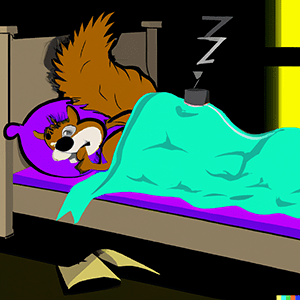ADHD and Sleep

If you have ADHD, you know that it can affect every aspect of your life including your sleep. In fact, sleep problems are one of the most common symptoms of ADHD.
There is good news. There are things you can do to help improve your sleep. In this blog post, we'll explore the link between ADHD and sleep and give you some tips for improving your sleep hygiene.
ADHD and sleep are often intimately connected. For many people with ADHD, difficulty falling asleep or staying asleep is a real and significant problem. In fact, research suggests that people with ADHD are more likely to experience sleep problems than those without the condition.
There are a number of possible explanations for why people with ADHD may have difficulty sleeping.
One theory is that it may be due to an underlying neurological difference. Another possibility is that people with ADHD are more prone to anxiety and stress, which can make it harder to fall asleep or stay asleep. Additionally, certain medications used to treat ADHD can also cause insomnia.
Whatever the cause, sleep problems can have a major impact on quality of life. Difficulty sleeping can make it hard to concentrate during the day, and can lead to fatigue and irritability. It can also worsen symptoms of ADHD, such as impulsivity and hyperactivity.
Sleep Hygiene
There are a few key things to keep in mind when it comes to sleep hygiene if you have ADHD.
First, it’s important to establish a regular sleep schedule. This means going to bed and waking up at the same time each day, even on weekends. A regular sleep schedule can help regulate your body’s natural sleep rhythm and make it easier to fall asleep and stay asleep. This means going to bed and waking up at the same time each day, even on weekends. A regular sleep schedule can help regulate your body’s natural sleep rhythm and make it easier to fall asleep and stay asleep.
Second, create a peaceful and relaxing environment in your bedroom. This means keeping the room dark, quiet, and cool. Consider using blackout curtains or an eye mask to block out light, earplugs to reduce noise, and a fan or air conditioner to keep the temperature comfortable. This means keeping the room dark, quiet, and cool.
Third, avoid using electronics in the bedroom. The blue light from screens can disrupt your body’s natural sleep cycle and make it harder to fall asleep. So instead of watching TV or scrolling through social media in bed, try reading or listening to calming music before bedtime.
Fourth, limit caffeine and alcohol intake before bed. Caffeine is a stimulant that can keep you awake, while alcohol may make you drowsy but can also interfere with quality sleep. So avoid drinking coffee or tea late in the day and limit alcoholic beverages to 1-2 drinks per day.
Finally, get up and move around during the day. Exercise can help you sleep better at night by improving your overall sleep quality and quantity. Just be sure not to exercise too close to bedtime as this can make it harder to fall asleep.
Try following these tips for better sleep hygiene, you can improve your ADHD symptoms and get the restful night’s sleep you need!

